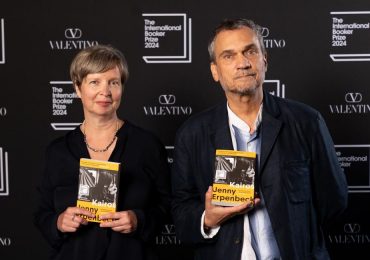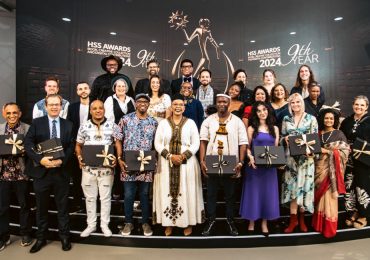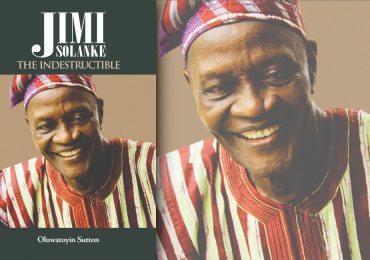Professor Harry Garuba, renowned academic, author and poet, has died, aged sixty-one.
Garuba passed away on the evening of 28 February 2020 following a long illness.
In a statement, the University of Cape Town, where Garuba taught for much of his career, lauded him as ‘a masterful writer and poet’, ‘a luminary in the field of African literature and a champion of postcolonial theory and postcolonial literature’.
The JRB editor Jennifer Malec recalls, ‘Harry taught me African literature and philosophy during my MA at UCT in 2005. I remember him as an extremely kind, gentle man, with a wicked sense of humour and an extraordinary mind.
‘One of my earliest memories of Harry is when he failed almost our entire MA group for our first essay. We were all fairly shocked, because he was such a genial guy. Looking back I could see the funny side; I’m pretty sure he was trying to shock us out of our comfort zone. And it worked. He was a wonderful teacher and most of us ended up excelling in his class. He will be greatly missed.’
Garuba was born in Akure, southwestern Nigeria, in 1958. At seventeen he began his undergraduate studies in English at the University of Ibadan. He earned his PhD at the same university, with a dissertation titled ‘Mask and Meaning in Black Drama: Africa and the Diaspora’, in 1988. He taught at Ibadan for fifteen years before emigrating to South Africa to teach in the English Department at the University of Zululand.
In 2001 he moved to the University of Cape Town, where he taught in the African Studies and English departments until 2019, and published widely in the fields of African and postcolonial literature.
Perhaps Garuba’s most important intellectual intervention was his 2003 paper ‘Explorations in Animist Materialism: Notes on Reading/Writing African Literature, Culture, and Society’, published in Public Culture, in which he developed the idea of animist thought as a system that spiritualises physical objects, ‘a continual re-enchantment of the world‘. Garuba theorised that ‘an animistic understanding of the world applied to the practices of everyday life has often provided avenues of agency for the dispossessed in colonial and postcolonial Africa’. The ideas he presented in this paper are regularly cited by academics today.
Garuba was something of a prodigy. In 1977, when he was still a teenager, his one-act play Pantomime for Saint Apartheid’s Day was published in the Festac Anthology of Nigerian New Writing, a publication compiled on the occasion of the Second World Black and African Festival of Arts and Culture, a major international festival held in Lagos, Nigeria.
He published his first volume of poetry, Shadow and Dream & Other Poems, in 1982, when he was just twenty-four, and at that stage was already regarded as one of the Nigeria’s most outstanding poets.
In 1988 he edited the collection Voices from the Fringe: An ANA Anthology of New Nigerian Poetry. Later in life, in 2017, he finally published a second collection of his own poetry, Animist Chants and Memorials.
In addition to being an author and poet, Garuba was a member of the editorial advisory board of the Heinemann African Writers Series and one of the editors of the journal Postcolonial Text. He served as acting dean of the Faculty of Humanities from February to December 2017, and held research fellowships at the University of Texas at Austin, Harvard University and Emory University.
UCT’s statement continues:
‘His dedication to his field was critical in developing the UCT Centre for African Studies as a hub for research on the African continent. As part of the university’s Curriculum Change Working Group (CCWG), Professor Garuba was committed to developing thinking about what a decolonised curriculum would look like in Africa and the global south and what a multicultural curriculum would look like in the West. He believed that the curriculum was a particularly good place to plant the seeds of transformation and these insights made him a critical part of the CCWG and the university at large.
‘Professor Garuba was committed to teaching students to be analytical, to question, to engage, to ask difficult questions and to use their imagination in solving real-world problems. During his tenure as director of the School of African and Gender Studies, Anthropology and Linguistics and acting dean of the faculty, he was a strong leader who displayed wisdom and empathy and will be remembered for his warm personality and commitment to a truly transformed university centred around its African identity.’
Acting Vice-Chancellor Associate Professor Lis Lange remembered Garuba as ‘a genuine person who dedicated his time to moving the university forward and supporting his students’.
‘Professor Garuba’s scholarship was driven by a deep dedication to his students and to decolonising the study of Africa,’ she said. ‘His passing is a great loss to the university and the transformation project, but we must continue this important work in his absence and build on the foundation he has left.’
Dean of Humanities Associate Professor Shose Kessi described Garuba as ‘a beautiful soul with a kind and generous spirit—an African intellectual and icon. He was a mentor to many colleagues and young scholars at UCT. He was loved by many and will be dearly missed.’
Garuba is survived by his immediate family in Cape Town, his wife, Zazi, son, Ruona (twenty), and daughter, Zukina (fourteen).
Details of the funeral and memorial service will be shared by the UCT English Department as soon as the information is available.






Dear Harry:
Your passage has left a void in the company of your friends and we will miss your playful subversion and profound wit. It is true that you lived a full life between Ibadan and Cape Town but the abrupt departure reminds me of a shocking, legendary ‘abiku’ in his/her fullest capacity to disarm friends in the lightening ability to traverse incredible intellectual and material boundaries. You have always been talented, amiable and sparkling bright. Do look back and rue the dilemma and loneliness into which you have plunged us. But we take consolation in the animist fact that you will always be around to be loved and remembered all over again. I sincerely remember our last dinner here in Ibadan and how you called back to tell me you were at the departure lounge of the airport. If this is an intended farewell and curtain call, then take your deserved rest and recuperation. Tell Irele and Teju to make you welcome. In requiescat in pace. So long and welcome beloved friend.
Dele Layiwola.
Maple Tree Literary Supplement, MTLS – Call for Submission: Special issue on Harry Garuba.
After the generation of Wole Soyinka, Chinua Achebe and John Bekederemo-Clark, Harry Garuba, as a world-renowned scholar and poet based in Ibadan where he also led the Thursday group of poets, was at the bridgehead of a new wave of Nigerian Literary culture and scholarship since the 1980s till his passing in February 2020. For over 30 years, he sponsored, mentored, taught, supported and befriended that new generation of academics and writers. Always self-effacing, he never took or sought credit for his intellectual, financial and moral generosity, a palpable example of which was the 1987 poetry anthology, “Voices from the Fringe,” which he organised and edited. This work is a formal introduction of the third generation of Nigerian writers to the literary world. In the area of scholarship Garuba’s quiet but powerful intelligence and erudite influence is widespread. His academic essays are landmarks of rigorous postcolonial enquiry within a global school culture. Garuba inspired and straddled the scholarly, writerly and social worlds of a visionary generation of intellectuals. The Maple Tree Literary Supplement, MTLS, calls for submissions from all, and especially the “Thursday Group”, about Garuba’s life and work in the form of poetry, essays – scholarly and otherwise – mementos or even prose fiction. These submissions which be published in MTLS and later collected into an anthology. Submission may be sent from the journal’s submissions page at https://www.mtls.ca/issue24/submissions/ or at managingeditor@mtls.ca or esulaalu@gmail.com
Professor Harry Garuba taught creative writing and I was fortunate to be one of his few students. His brilliance, use of language and the expanse of his creative ingenuity were quite overwhelming. He was friendly, gentle, smart and humane. He was a friend, yet a mentor. I cherished every moment spent together with you and was longing to see you again in Cape Town soon, but you departed sooner than I expected. Thank you & Good night.
May I note that Harry Garuba obtained his PhD from the Department of English at the University of Ibadan in 1988, with his dissertation “Mask and Meaning in Black Drama: Africa and the Diaspora”, but it was never ‘published’ as an ‘academic book’.
Thank you, Idowu, we have amended the post.
Great friend and intellectual!